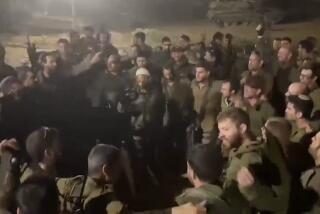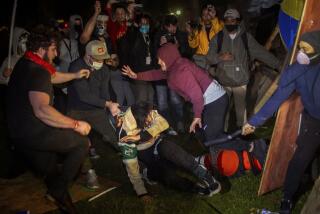Ecuador military meets match
Intelligence failures, security lapses and the lack of civilian oversight brought to light by a recent Colombian military incursion into his country have prompted Ecuadorean President Rafael Correa to overhaul the command of his armed forces.
Correa’s shake-up comes in a nation where the military enjoys a high measure of autonomy, wields considerable economic and political power and has played a hand in the overthrow of three presidents since 1997.
“Past presidents couldn’t have attempted this, but Correa has space to maneuver,” said Bertha Garcia, a professor at the Pontifical Catholic University in Quito, the capital, highlighting Correa’s favorable standing in opinion polls and the country’s oil windfall. “His advantages include enormous popular support, $120-per- barrel oil and the public’s fatigue with the old system.”
Correa’s displeasure with his armed forces was evident last month when he forced the resignation of Defense Minister Wellington Sandoval and three top security force officers: Joint Chiefs commander Gen. Hector Camacho, army commander Gen. Guillermo Vasconez and National Police commander Gen. Bolivar Cisneros.
Correa is expected to appoint a seven-member commission in the next several days to look into what he says is possible CIA infiltration of his military’s intelligence.
The military’s exalted status under Ecuadorean law is expected to change with the new constitution that Correa’s legislative allies are drafting in a special assembly, which will be put to a national vote. The nation’s security council, which sets the military’s strategic course, will emerge with a more civilian makeup, Deputy Defense Minister Miguel Carvajal said in an interview.
“We’ll see a more multi- dimensional council, including people from more areas of civilian life,” Carvajal said.
The March 1 incursion by Colombian forces to kill the No. 2 commander of the rebel Revolutionary Armed Forces of Colombia, Raul Reyes, called Ecuador’s military readiness into question. So Correa has ordered the $200-million purchase of 24 Super Tucano aircraft from Brazil, plus a new radar system to better secure his borders.
The actions reflect Correa’s frustration with a military that at times seems to be working at cross purposes with his government.
Hours after Colombian army units killed Reyes, Correa ordered his army to arrest the 20 or so Colombian soldiers who remained behind to secure the jungle campsite. But someone in Ecuador’s armed forces apparently leaked word of the order, and by the time army units showed up that afternoon, the Colombians were gone, Carvajal said.
Two weeks later, Ecuador’s army brass knew that one of the 24 people killed in the Colombian raid was an Ecuadorean who had acted as local fixer for the rebels and had been tracked by military investigators for several years. Ecuadorean officers gave the information to Colombia but apparently not to Correa, who said he found out about it from the newspapers.
Such lapses, combined with the fact that Correa had no idea his country had been invaded until Colombian President Alvaro Uribe told him by telephone hours later, pushed Ecuador’s leader to shake up the command.
After Ecuador emerged from military dictatorships in 1979, defense ministers were either active-duty or retired military commanders. That changed under Correa; since taking office last year, he has named only civilian defense ministers.
Although its record is not as repressive as those of armed forces in some countries, Ecuador’s military has always been a political player. Unlike some nations’ constitutions that limit the armed forces to defending the homeland from external threats, Ecuador’s charges the armed forces with maintaining internal security. Moreover, the military is the only government entity that gathers intelligence, said Garcia, the professor.
The Ecuadorean armed forces also have a formidable economic presence through their ownership of a fleet of oil tankers, the Tame airline, tourism companies, dairy farms, hotels, shrimp boats and a number of other assets. That economic power is sometimes used to bend politicians and businessmen to their will through favors and bribes, sources said.
The military seemed to have overplayed its hand early last month, said Freddy Rivera, a military analyst at a Quito graduate school and think tank known by its initials, FLACSO.
After Correa fired Sandoval and publicly criticized the military for intelligence lapses, the joint command issued a statement calling for “open and transparent dialogue” with Correa. The statement, Rivera said, reflected the military’s attitude that it could bargain “like some powerful union” with commander in chief Correa, not simply follow orders.
“It was an impertinence,” Carvajal said Tuesday.
Correa responded with the forced resignations. Previous presidents might have suffered sudden job loss as a result, Garcia said, but Correa, who enjoyed a 62% approval rating in a recent poll, has stood firm.
--
More to Read
Start your day right
Sign up for Essential California for news, features and recommendations from the L.A. Times and beyond in your inbox six days a week.
You may occasionally receive promotional content from the Los Angeles Times.






